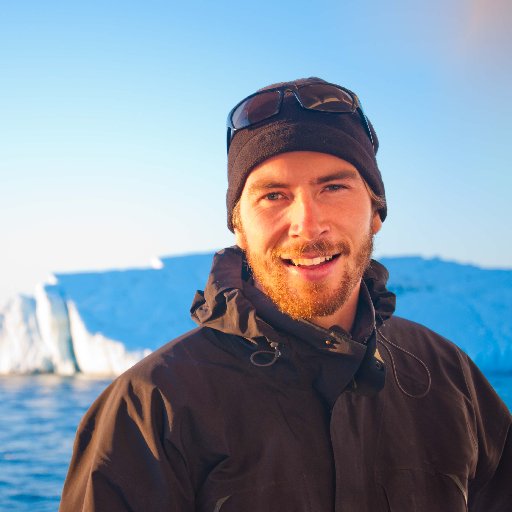
Maxime Geoffroy
@MaximeGeoffroy1
Followers
262
Following
5
Media
1
Statuses
67
Research Scientist at the Centre for Fisheries Ecosystems Research, Marine Institute of Memorial University of Newfoundland.
St. John's, Newfoundland, Canada
Joined August 2017
With Norwegian collaborators, we are recruiting a PhD student in biodiversity and genomics to work on data from the Central Arctic Ocean. Please share if you know anybody who could be interested
0
2
2
Our last paper on the use of broadband acoustics to classify zooplankton. Well done Muriel Dunn!
academic.oup.com
Abstract. Classification of zooplankton to species with broadband echosounder data could increase the taxonomic resolution of acoustic surveys and reduce t
0
1
13
Two new papers about our work in Labrador. One on the distribution of fish in the Lake Melville estuary and another one on the use of eDNA for biodiversity estimates in offshore environments. Well done Tiffany Small and Dave Coté. https://t.co/D5BDZLP5X1
https://t.co/qS6GIADgnj
0
2
6
Our last paper on the effects of melting sea ice on zooplankton distribution in the Arctic
0
6
15
A ground-breaking study by 43 international scientists from 26 institutions led by Dr. Maxime Geoffroy sounds the alarm on #climatechange consequences for #Arctic cod and the entire Arctic #ecosystem. @MaximeGeoffroy1
gazette.mun.ca
A groundbreaking scientific review article led by a Marine Institute researcher sheds light on the significant effects of climate change and increased human activity on Arctic cod and the entire...
0
7
5
Our review paper on the circumpolar impacts of climate change on Arctic cod is finally out. 43 scientists from 26 international institutions who reviewed 395 scientific papers published since 1954.
online.ucpress.edu
Arctic cod (Boreogadus saida) is the most abundant forage fish in the Arctic Ocean. Here we review Arctic cod habitats, distribution, ecology, and physiology to assess how climate change and other...
0
3
5
Our research on marine ecology during the polar night has been covered by Nature magazine.
nature.com
Nature - An international team braved the far north in January to unlock secrets of how marine organisms tell day from night during the polar winter.
1
14
56
And another one from PhD student @mumudunn on the use of broadband acoustics from autonomous surface vehicles to study zooplankton. Well done Muriel!
cdnsciencepub.com
Throughout all oceans, aggregations of zooplankton and ichthyoplankton appear as horizontal sound scattering layers (SSLs) when detected with active acoustic techniques. Quantifying the composition...
1
1
6
Our last paper on the biogeography of mesozooplankton across the Canadian Arctic. Well done Gérald Darnis!
0
6
9
Our new paper on mesopelagic fish and zooplankton at high latitudes is now published. Well done @JChawarski !
0
1
6
Our #research team stopped in Nain to pick up equipment and a colleague – Frédéric Dwyer-Samuel, environmental assessment manager for the #Nunatsiavut Government – before heading to the Hopedale Saddle #MarineConservationArea to gather #habitat & #oceanographic data. @DFO_NL
2
5
17
And we are also recruiting a PhD student to work on Arctic pelagic ecology at the polar front, with field work in the Barents Sea
0
36
27
We are recruiting one postdoc in marine ecology and modelling to work on glacial troughs in the Arctic. Deadline to apply is January 31st.
0
53
30
Our new study on the use of artificial light, including red light, when deploying scientific instruments at sea. We observed stronger avoidance behavior than expected
nature.com
Scientific Reports - Pelagic organisms avoid white, blue, and red artificial light from scientific instruments
0
5
12
Interesting PhD opportunity with some colleagues in Norway
0
3
3
We are excited to have @MaximeGeoffroy1 present at this week’s seminar, Friday, November 13th! Dr. Geoffroy will be presenting on Fish and Fisheries in a Changing Arctic! (1/2)
1
2
2
Interesting article about the work we have been conducting to find shipwrecks in Svalbard
Are shipworms—one of the world’s most voracious destroyers of underwater heritage—consuming the Arctic's sunken wrecks before archaeologists and historians can find them? #underwaterarchaeology #Svalbard #shipwrecks
https://t.co/I76HtINrpG
0
0
2
PhD position in zooplankton ecology available in Norway https://t.co/eq81G5HZPE
0
8
5







